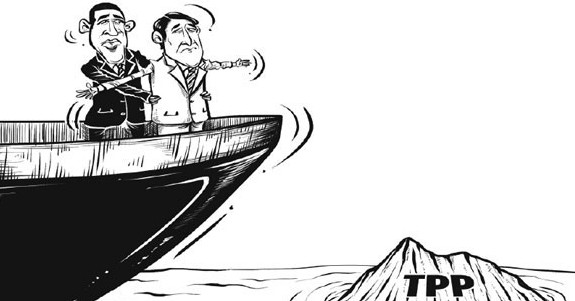

By according the warmest possible welcome to US President Barack Obama on his three-day visit to Japan from Wednesday, Japanese Prime Minister Shinzo Abe is aiming to expedite the Trans-Pacific Partnership negotiations in order to end the frictions between Washington and Tokyo. Also, Abe thinks that progress on the trade front can, to some extent, ease tensions between the US and Japan after he ignored Washington's caution to visit Yasukuni Shrine, which honors 14 Class-A war criminals, and angered Japan's neighbors, especially China and the Republic of Korea.
Tokyo and Washington are still at loggerheads over a number of issues, especially on reduction of subsidies and import tariffs, in the TPP free trade negotiations. To be more specific, Tokyo and Washington have been at loggerheads over what Japan describes as its five "sacred sectors" - rice, wheat, sugar, dairy products, and beef and pork. Japan wants to protect these sectors, but the US demands full access to the Japanese market for its agricultural goods. Also, Washington insists that Japan lift some technical barriers - like the huge tariff on automobile imports - that prevent some US-made cars from being sold in Japan.
During his talks with Japanese TPP minister Akira Amari on April 9, US Trade Representative Michael Froman reaffirmed that TPP is an organization for economic cooperation with "high ambitions", which include elimination of import tariffs on all products. This means the two sides can reach an agreement only if both make huge concessions.
But if the US makes concessions on tariffs on agricultural products, the ruling Democratic Party could lose many seats in Congress during the upcoming mid-term election because the agriculture sector will not support its candidates. And since the US Congress has not yet granted Obama the Trade Promotion Authority and garnering more votes in the mid-term election is much more important for the Democratic Party than reaching a TPP agreement with Japan, Froman will not easily compromise in this round of negotiations.
Since February Japan has adopted a new strategy, that is, expediting negotiations on tariffs on agriculture products with other countries. Apart from the US and Japan, the TPP negotiations also involve Australia, Brunei, Canada, Chile, Malaysia, Mexico, New Zealand, Peru, Singapore and Vietnam. The TPP, if finalized, will account for 40 percent of global GDP and more than 30 percent of global trade.
According to its new strategy, Japan has already reached an agreement (called the Economic Partnership Agreement) with Australia, which includes a deal on the tariff to be imposed on beef imported from Australia. Besides, Japan plans to accelerate its tariff negotiations with New Zealand on dairy products, with Mexico on pork, with Malaysia on plywood and with Vietnam on rice. If Japan succeeds in signing agreements with these countries, it could force the US to make concessions in the TPP negotiations.
But whether Japan and the US can reach an agreement this year is still uncertain because the two sides are yet to sort out their differences on a number of issues. For Obama, handicapped as he is without the Trade Promotion Authority, it is quite difficult to succeed in this round of TPP negotiations. And for the Abe administration, it wouldn't make sense to make concessions on tariffs because it could pay a heavy political price - losing the support of the agriculture sector - at home for that.
With the US and Japan both adopting a tough approach, it seems that their TPP negotiations will be tougher.
TPP an albatross around US neck
2014-04-24‘Gaps remain‘ in US-Japan TPP talks
2014-02-25Japan may compromise in TPP farm trade talks
2014-02-18TPP, a blessing for Asia-Pacific economies?
2013-12-18China open to joining TPP: MOC official
2013-12-05China takes open position toward TPP: Premier Li
2014-04-10Copyright ©1999-2018
Chinanews.com. All rights reserved.
Reproduction in whole or in part without permission is prohibited.